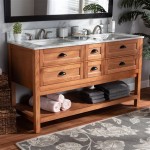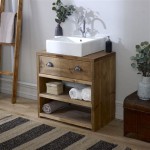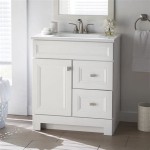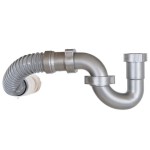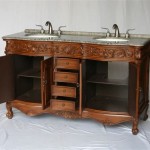Simple Bathroom Sink Design: Essential Aspects for a Functional and Stylish Bathroom
The bathroom sink is a focal point of any bathroom, serving both functional and aesthetic purposes. Designing a simple yet effective bathroom sink can elevate the overall ambiance and create a space that is both comfortable and stylish. Here are some essential aspects to consider for a well-designed bathroom sink:
1. Sink Shape and Size
The shape and size of the sink should complement the available space and the overall design scheme. Rectangular sinks are classic and versatile, while round or oval sinks can add a touch of softness. Consider the size of your vanity and the number of drawers or storage compartments it has to determine the optimal sink size.
2. Material Selection
The material of the sink plays a significant role in its durability, maintenance, and overall appearance. Vitreous china and ceramic are popular choices for their durability and resistance to stains, while acrylic and composite materials offer a wider range of colors and textures.
3. Sink Style
The style of the sink should align with the bathroom's overall aesthetic. Traditional pedestal sinks offer a classic and elegant look, while floating sinks create a more modern and minimalist feel. Vessel sinks, installed on top of the countertop, add a unique and eye-catching element.
4. Faucet Selection
The faucet is an integral part of the sink design. Choose a faucet that complements the sink's style and provides the desired water flow and temperature control. Single-handle faucets offer ease of use, while two-handle faucets provide more precise control. Consider the spout height and reach to ensure it accommodates your needs.
5. Countertop Choice
The countertop material around the sink can greatly impact its overall appearance. Granite, marble, and quartz are popular options for their durability and elegance. Laminate and solid-surface materials offer a wider range of colors and patterns, allowing for more customization.
6. Storage and Accessibility
Incorporate storage around the sink to keep essential items within easy reach. A vanity with drawers or shelves provides ample space for toiletries and towels. Consider adding a mirror with built-in storage to maximize space and create a cohesive look.
7. Lighting Considerations
Proper lighting is crucial for a well-designed bathroom sink. Natural light, if available, should be maximized. Artificial lighting, such as sconces or overhead lighting, should provide adequate illumination for tasks like shaving or applying makeup. Consider the placement of lighting fixtures to avoid creating shadows or glare.
8. Accessories and Decor
Accessorize the sink area with items that enhance its functionality and style. A soap dispenser, toothbrush holder, and towel bars are essential. Add decorative touches, such as a small vase or artwork, to create a personalized and inviting space.
Conclusion
Designing a simple yet effective bathroom sink requires careful consideration of various factors. By thoughtfully selecting the sink shape, size, material, style, faucet, countertop, and accessories, you can create a functional and stylish focal point that complements the bathroom's overall design. Keep these essential aspects in mind to elevate your bathroom and create a space that is both comfortable and aesthetically pleasing.

5 Simple Bathroom Sink Designs To Inspire You

15 Simple Best Bathroom Vanity Designs With Pictures Cabinets Design

Bathroom Sink Design Ideas For Your Home Designcafe

The Washbasin Daily Care In An Elegant And Functional Bathroom Inspirations Tips Cersanit

15 Adorable Wash Basin Designs You Need To See Bathroom Decor Accessories Contemporary Washbasin Design

Bathroom Vanity Styles To Fit Your Space Forbes Home

Small Bathroom Wash Basin Design Ideas Beautiful Homes

21 Simple Small Bathroom Ideas Victorian Plumbing

20 Best Bathroom Sink Ideas To Elevate Your Space

10 Stunning Bathroom Cabinet Designs For A Small Space
Related Posts
